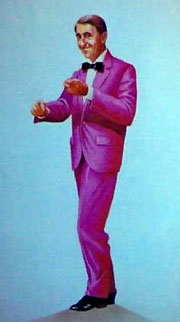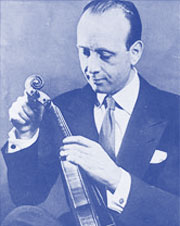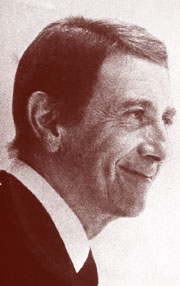Biography of Franck Pourcel
The following is taken from an entry from 2006 on Wikipedia about Franck Pourcel. It was taken from the liner notes on a Franck Pourcel compilation and redacted by Pourcel's daughter, Francoise Pourcel.
FRANCK POURCEL - "In the strange world of show-business where you can find
many con-artists and wind merchants, there is a distinguished
man, whose look is more that of a diplomat than an artist:
Franck Pourcel is discreet, modest and without pretence, this
quiet man with a handsome silhouette has recorded and sold more
records than most French artists combined together. His career
spans the world: from Limelight and Blue Tango, to the Anthem
for Concorde, and finally Only You, he is the first French
conductor to have become famous in the USA. I do not desperate
to welcome him on my TV show with his 80 musicians."
That’s the way Michel Drucker described Franck in the seventies,
before inviting him twice on TV with his orchestra, in 1981 and
1984. Michel liked to tell the story of my father, who was often
taken for an American, and the rising of "this calm man in the
middle of French Variety".
Franck Pourcel was his real
name: last name originally from Italy, first name a tribute to
the composer César Franck. He was born in Marseille on August
11, 1913, and he died on November 12, 2000. His father was a
technician but also a musician in the Navy in Marseille. At six
years old, he began learning music and his father sent him to
study the violin at the Conservatoire de Marseille, and drums
too because he loved jazz. Then he went to the Conservatoire in
Paris: "My dream was to become a famous soloist. After my
studies and the army, I had to work in order to live"
He then came back to Marseille where he worked in theaters, one of
them the Opera, and at night he played drums in nightclubs. This
explains, how, later, his orchestrations will be based on
strings and percussions.
In 1939 he would married Odette.
During that period, Franck was the musical director of some
singers, among them Yves Montand, and he was hired for 3 months
by Bruno Coquatrix, the future manager of the Olympia de Paris,
to be the conductor of the famous singer Lucienne Boyer; he
would in fact stay 8 years and tour around the world with her.
But he always had a dream: his own orchestra, which could
freely express his musical feelings. He always worked toward
this dream, but between the dream and the reality, it was very
difficult: records companies were not keen on hiring 50
musicians! "At that time, creating an orchestra with 50
musicians sounded nuts, but I wanted it. After many refusals, I
moved to United States".
So, the 3 of them emigrated to New York in 1952, and between small jobs, and a wait to obtain the
card from the musicians Union, that he will get, he kept looking
for a producer. But, it’s a French one, Maurice Teze, who will
call him in 1953 to ask him to get back to Paris in order to
produce his first record Blue Tango and the follow up Limelight.
People took him immediately for an American, super quality
label at that time, and instantly he became famous: "Had I used
the name of "Marius" Pourcel (his second first name), maybe my
career would have turned short" he said with a smile and in the
accent of Provence. It was the start of his long career, and all
the French singers are eager to be accompanied by the "American": Aznavour, Tino Rossi, Gloria Lasso, Bécaud, Montand, Trenet,
Danielle Darrieux, and later I opened the door to an actor
who had just appereared in West Side Story, and wanted to
produce his first record with Franck: George Chakiris.
Franck was very serious, dedicated to his work and tireless; he
was a perfectionist, writing his arrangements himself, choosing
the songs, the musicians, the studio, the editing, and the
composition of the cover. He was so meticulous that sometimes
his musicians thought he was a tyrant! He revitalized the
violin. Jazz and popular music had little by little succeeded in
removing the violin from any importance in musical
entertainment. Franck, believing in the violin’s versatility and
enormous possibilities, constantly fought this trend. Needless
to say he was successful!. To pronounce the word "violin" is to
touch the heart of Franck; "For me, the violin is the
instrument closest to the human voice. I don’t play it, I make
it sing. It should be considered a vocal instrument, an
instrument that speaks to the heart of man".
Between 1954 and 1957, he kept recording: 9 LPs in 3 years. He creates the
series "Amour Danse et Violons", which include 54 LPs.
But
the Americans look at him, and he went back to Hollywood at
Capitol to record albums dedicated to the American market, like
Our Paris, French Touch, French Sax,
French Wine-Drinking music
and La Femme
(composed by Les Baxter) with its graceful and
scandalous nude cover. He became "Franck Pourcel and the
French Fiddlers", "Franck Pourcel and his Parisians strings" or
"The Rockin’ strings Orchestra" !! In 1959, he recorded Only
You, 2 years after the fantastic success of the title by The
Platters. But arranging it "à la Franck Pourcel" he gave it a
second youth.
All my life I'll remember my father and me
arriving at Capitol Tower, a mythic place in Hollywood,. The
song was played all day long inside the building, but the record
had a tiny distortion. He was furious, and I thought that he was
going to have a nervous breakdown, until someone told him
that he was going to have a big hit; he would sell more than 3
millions copies, be on the Billboard charts for 16 weeks, and
become the first European orchestra leader to sell more than 1
million records in the US.
In 1958, he recorded an LP
with the Viennese’s Waltzes, and then decided to lead his
"Variety" public to the discovery and appreciation of popular
classical pieces. With his "Pages Célébres" he led the sale of
EMI Classics, but he felt no special vanity from this, for he
considered himself in the service of music. He will record
17 LPs with the most famous classical orchestras like the London
Symphony Orchestra, The London Philharmonic, The Lamoureux
Orchestra, The BBC Orchestra….. In 1979, following the evolution
of the recording techniques, the series came to be called
Classics in Digital. "Adapting pop songs or classical pieces
is a very delicate work because you have to dose the effects. I
studied classics, and I am persuaded that if Mozart or Beethoven
were here today they would wrote their music in a different
arrangement. For them or the Variety, I write a kind of translation, according to my style, I think I am not betraying
them. I often compare music with cooking. For the same recipe a
chef can do something personal, the name of the dish remains the
same, but the taste is different. Same thing with a score…. I
was lucky in my life to be able to succeed in interpreting, my
way, some music composed by others. I arrange it (or
disarrange), and the original composers are happy".
"Franck has the talent to ennoble the most simple
melodies…..entering his music was and still is like entering the
Pantheon" said Salvatore Adamo.
A few of his musicians
started a career on their own: "Michel Legrand was playing
piano, when he was young. In my orchestra I had Raymond Lefevre,
Paul Mauriat and Jean-Claude Casadessus, at that time playing
percussions in my classical recordings".
Between 1956 and 1972 he was the regular conductor for France at the
Eurovision
Song Contest, and he toured a lot in Japan, USA, South America,
and appeared on TV -show specials, all around the world.
A very discreet man, he never played up his personal or
professional life. His record company has always had difficulty
to write a biography mentioning how many records he sold (the
sales if they were to be piled, one on top of the other, would
represent 20 times the high of the Eiffel Tower), or how many
gold records he got throughout the 58 countries where his albums
were released. He was proud of his trophies, but didn’t talk
about them. He smashed all sales records for the Europeans
orchestras without fanfare or boosting. He rather preferred to
show his back directing the orchestra than his face to a camera.
He rarely put his picture on the front of a cover "to recognize
someone you have to appear on TV or movies. The public knows my
name, I was the first one to do this kind of music in Europe".
Nevertheless I watched him in 1984, during the pageant of Miss
Mexico. He was President of the jury, and all the beautiful
girls wanted to sit on his laps. He did not look unhappy!!!
His records have been exported to 58 countries;"I am going
to surprise some people, but I have been the number 1 in the
exportation of French records for 20 years (in 1982). Music is
easier to export than songs with lyrics. When a record is
produced in France it can be released the morning after in
Yokohama or Los Angeles: there is no local version "
I remember that in 1975 Franck was asked by Air France to compose
the Anthem for the new supersonic Concorde, because he was
considered as one of the 3 most exported French product with
Brigitte Bardot and Air France.
He has composed some songs that he recorded, but rarely, because he did not liked his
own compositions. The most famous, Chariot, started like a joke.
It was composed with his friends Paul Mauriat and Raymond
Lefevre , with lyrics by Jacques Plante. At that time, in 1962,
everything coming from the US was striking gold, so they
invented a story that the song was the soundtrack of a new
western movie produced by the 20th century Fox "You'll never See
It". Petula Clark sung the song and had a hit. In the USA
the song was recorded as I will Follow Him by Little Peggy
March, a fifteen years old singer, became number 1 in the
Billboard charts all categories for 3 weeks, and in 1992 the
song became the main theme for Sister Act 1 and 2, with Whoopi
Goldberg. More recently, Eminem included some bars in his song
Guilty Conscience.
From 1968, Franck worked with Claude-Michel Schönberg then artistic director at Pathe-Marconi
EMI records. A personal and professional relationship started
and Franck produced Claude-Michel’s big hit "Le Premier Pas" and
the following albums.
A show-biz star, against all odds,
concerts all over the world, around 200 LPs recorded, more than
3000 titles in his repertoire, this was Franck Pourcel, my
father. Five years after his death, thousands of faithful fans
around the world send me messages, and these 4 CDs with some 100
titles from his catalogue, are dedicated to them.
"Hearing this heavenly fiddler, I now understand why instrument
makers call a body of a violin its soul". These words are from
the French poet Jean Cocteau : the fiddler was Franck Pourcel.






